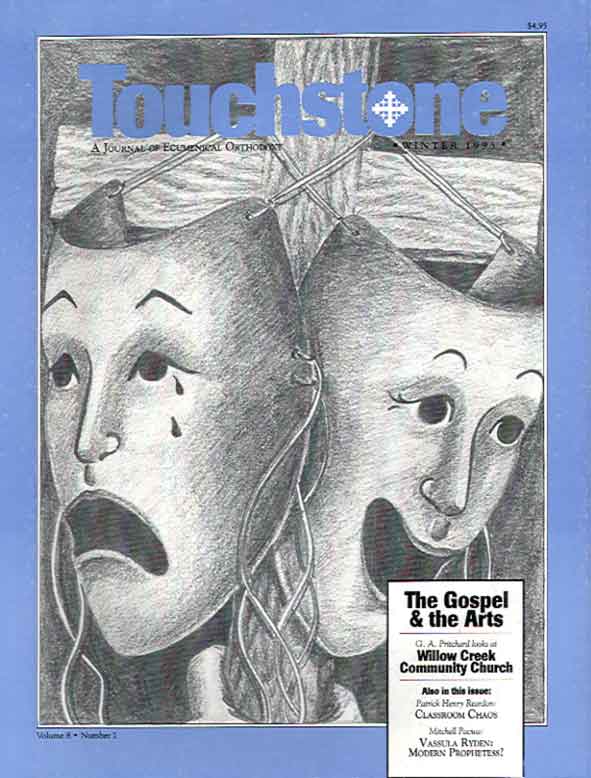Making an Issue of It: A Word from the Gnomes
Their faces look out from an increasing number of conservative Christian publications, but not with feminism’s grim purpose or triumphal leer. These are the pleasant faces of sane, balanced Christian women who do not hate men and may not even consider themselves feminists in any sense, but who still believe they are following God’s vocation to be priests or pastors. While they may be very conscious of equality issues and use what is called inclusive language for members of the human race, they have no interest in reconstructing Christian theology from the ground up, and speak of God in traditional terms. Their congregations profit from the truth they bring. As a group they are, by the professional standards of the modern pastorate and the expectations of the average parishioner, at least as good as men. One can hardly doubt that God is working through them, and so every pastoral trial and victory becomes, in their own minds and the minds of those who send them, confirmation of the validity of their call. Much light, it would appear, is shining here, and the fresh wind of God blows.
Meanwhile, exiled by their own intolerance from the scenes of life and action, stooped, purblind gnomes, gurgling out threats and violence against every new work the Holy Spirit is doing in this generation, whack out books and articles—and editorials— ad nauseam against the ordination of women— any women, even enormously Nice, evangelical ones. Creatures of arrested development, and increasingly furtive these days (eventually, no doubt, to become merely the stuff of legend), they scuttle about behind the scenes doing mischief wherever they can. They frighten the parson’s cows so that milk production is off, and take perverse delight in stirring up the swine, many of which they have stampeded off to other rooting grounds. Alas, Pharisee is with us still—smaller, meaner, and uglier as time goes on and knowledge increases—still confusing doctrine with the traditions of males.
The reader will grasp the point. The most effective weapon in the arsenal of those who favor women’s pastoral ordination is, as in Aesop’s fable, not the wind but the sun. It is far easier for us to resist nasty people than nice ones, and painful for people of strong conscience to rebuke those they can recognize as, in many respects, better than themselves. The temptations surrounding our quandary are many, but all of them suspend us between two magnetic poles—that of denouncing the otherwise orthodox proponents of women’s ordination as infinitely worse than the confessed heretics and abandoning them completely to their seducing devil, or to that of giving up and joining the swelling ranks of Nice People who can have their orthodoxy and women’s ordination too. Taking either route means some initial pain for the conscience—breaking charity in one case or torturing Scripture and tradition in the other. But at the end of the process firm attachment to either of these poles gives relief from any number of painful dilemmas.
We at Touchstone hope we will gravitate in neither direction, but continue to tread the difficult line between damning those who insist on the orthodoxy of women’s ordination and accepting their error. We will persist in pointing out that this cannot be done in agreement with either Scripture or its historical interpretation, and that to do it we must actively disobey a command of the Lord delivered by an apostle. We will continue to insist that the women taking these offices with whom we might even agree on all other points of doctrine and practice are doing so not on the basis of a new consensus in the Church. Rather their vocations, certainly in mainline and evangelical Protestantism, come from feminism, issuing directly from the labors of the contumacious people who cut and marked the path upon which many far more amiable than they are presently walking.
We will recognize that the Lord has not abandoned these ordained women because of disobedience—if he did this, who would stand?—and that their work, which in part we can encourage, can bear wholesome fruit. We will not, however, see much of an analogy between toleration of women’s ordination and the patience we try to exercise in the face of Catholic, Protestant, and Orthodox disagreements, since this is something these communions have never disagreed upon. The practice is outside orthodox Christianity by any reasonable definition, historically an accompaniment of paganizing heresy or the enthusiasm that sets Spirit against Scripture. Feminism, which is made of both, is heretical in light of teachings we believe every Christian has always been bound to accept, and women’s ordination in this era has followed feminism’s path into the churches.
It is difficult to make hard and fast rules about how Christians who hold to Scripture and tradition here should relate at every point to those who do not, but the difficulties must be addressed, and we intend to keep the matter before us. Clearly it will involve a combination of firm separation and continued communication, of loving and appreciating the person while disapproving of some of what he believes and does. It will entail the painful process of self-examination on our part: Are we enjoying the fight, or does it feel more like a disagreeable obligation? Do we act out of self-righteousness? Are we becoming the gnomes or the Pharisees our detractors make us out to be? It is easy to do just that, and when one does, it is even easier to recoil into the resisted error ourselves, since when the accusation fits, the bad cure—that is, stop resisting and let it come—taken by so many decent Christians makes sense, and provides much relief.
We would be, however, neither gnomes, nor Pharisees, but plain, honest Christians, resisting the Spirit of the Age and letting the chips fall where they may. We have been clearly told that if we would follow Christ we must abandon both our own wishes and the hope of being loved by the world for whose favor we are appealing when we alter his Church to satisfy its demands. While we do not intend to harangue, neither will we let the matter drop, since it is one of the most pressing issues facing our generation.
The ordination of women to the pastoral offices radically alters the face of the Church, and so the way that God is known. To borrow a turn from Mary Daly, if women become the heads of churches, then the head of the Church is a Woman—or of confused sex, or it doesn’t matter. But the head of the Church is a Man, and everything about him, including that, matters.
If our readers think they hear echoes of the elder Cato in these pages, it will be because we continue to believe that women’s pastoral ordination, along with feminism that nurtures it, are Philistine institutions having no place in the Church. They must be broken up, spread across the plain, and sown with salt.
—S. M. Hutchens
S. M. Hutchens is a senior editor and longtime writer for Touchstone.
subscription options
Order
Print/Online Subscription

Get six issues (one year) of Touchstone PLUS full online access including pdf downloads for only $39.95. That's only $3.34 per month!
Order
Online Only
Subscription

Get a one-year full-access subscription to the Touchstone online archives for only $19.95. That's only $1.66 per month!
bulk subscriptions
Order Touchstone subscriptions in bulk and save $10 per sub! Each subscription includes 6 issues of Touchstone plus full online access to touchstonemag.com—including archives, videos, and pdf downloads of recent issues for only $29.95 each! Great for churches or study groups.
Transactions will be processed on a secure server.
more from the online archives
calling all readers
Please Donate
"There are magazines worth reading but few worth saving . . . Touchstone is just such a magazine."
—Alice von Hildebrand
"Here we do not concede one square millimeter of territory to falsehood, folly, contemporary sentimentality, or fashion. We speak the truth, and let God be our judge. . . . Touchstone is the one committedly Christian conservative journal."
—Anthony Esolen, Touchstone senior editor










